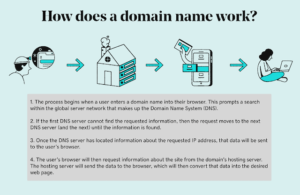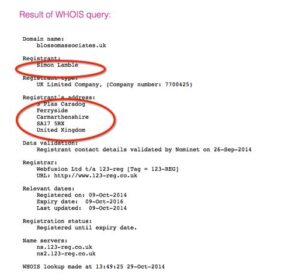Have you ever wondered if a website can have two domain names? Well, the answer might surprise you. It turns out that yes, a website can indeed have two domain names! This means that a single website can be accessed through multiple web addresses, providing users with more options to find and access the site. In this article, we will explore the concept of having multiple domain names for a website and delve into the benefits and considerations that come with it.
Having multiple domain names for a website can be advantageous in several ways. Firstly, it can help enhance your brand’s online presence by allowing users to find your website using different domain names that are easy to remember or specific to certain regions or target audiences. Additionally, having multiple domain names can improve your website’s search engine optimization (SEO) by increasing the chances of your site appearing in search results for different keywords or search queries. By strategically incorporating relevant keywords into your domain names, you can attract more organic traffic and boost your website’s visibility on search engine results pages. So, let’s dive deeper into the world of multiple domain names and discover how they can benefit your online presence.

Can a Website Have Two Domain Names?
In today’s digital age, having a strong online presence is crucial for businesses and individuals alike. One of the key components of establishing an online presence is having a domain name, which serves as the address for your website on the internet. But can a website have two domain names? In this article, we will explore the concept of having multiple domain names for a single website and discuss the implications and benefits of such a setup.
Why Would a Website Have Two Domain Names?
There are several reasons why a website might have two domain names. One common scenario is when a business wants to target different markets or regions. By having multiple domain names, they can create separate websites tailored to each specific audience. For example, a company with operations in both the United States and Europe may have one domain name for their US-based customers and another for their European customers.
Another reason for having multiple domain names is to protect your brand. Registering multiple domain names that are similar to your primary domain name can prevent others from using them or capitalizing on any potential confusion. This strategy helps to maintain your brand’s integrity and ensures that visitors are directed to the correct website.
The Benefits of Having Multiple Domain Names
Having multiple domain names for a website can offer several benefits. Firstly, it allows for targeted marketing and customization. By tailoring each website to a specific audience or region, you can provide a more personalized experience, which can lead to higher engagement and conversion rates.
Additionally, having multiple domain names can improve your website’s search engine optimization (SEO). Each domain name can have its own set of keywords, meta tags, and content, allowing you to optimize for different search queries and increase your visibility in search engine results pages.
Considerations When Managing Multiple Domain Names
While having multiple domain names can be advantageous, it also comes with some considerations. Firstly, you need to ensure that both domain names are registered and properly set up. This includes configuring DNS settings, setting up redirects, and ensuring that both domain names are pointing to the correct website.
Another consideration is the potential for duplicate content. It is important to create unique content for each website to avoid any penalties from search engines for duplicate or thin content. This can involve creating different landing pages, product descriptions, and blog posts tailored to each domain name’s target audience.
Conclusion
In conclusion, a website can indeed have two domain names. This can be beneficial for businesses targeting different markets, protecting their brand, or improving their SEO efforts. However, managing multiple domain names requires careful planning and consideration to ensure that both domain names are properly set up and that unique content is created for each website. With the right approach, having multiple domain names can be a valuable strategy to enhance your online presence and reach a wider audience.
Key Takeaways: Can a Website Have Two Domain Names?
- Yes, a website can have two domain names.
- Having multiple domain names can help with branding and targeting different audiences.
- Using multiple domain names can also improve search engine optimization and increase website traffic.
- However, it’s important to redirect one domain to the other to avoid duplicate content issues.
- Managing multiple domain names may require additional resources and maintenance.
Frequently Asked Questions
Question 1: Can a website have multiple domain names?
Yes, a website can have multiple domain names. This is known as domain aliasing or domain forwarding. It allows a website to have multiple URLs that all lead to the same content. For example, a website with the domain name example.com can also have an alias domain name like example.net or example.org.
Domain aliasing can be useful for various reasons. It can help protect your brand by securing multiple domain names with different extensions. It also allows you to target different audiences or regions by using domain names specific to those areas. However, it’s important to note that all domain names pointing to the same website will have the same content.
Question 2: How does domain aliasing work?
Domain aliasing works by setting up DNS records to redirect multiple domain names to the same website. When someone enters a domain alias into their web browser, the DNS records point them to the IP address of the main website. The web server then recognizes the requested domain name and serves the corresponding content.
To set up domain aliasing, you need to configure the DNS settings of your domain names. This typically involves creating a CNAME or A record that points the alias domain to the main website’s IP address. Once the DNS changes propagate, the alias domain will start directing visitors to the main website.
Question 3: Are there any SEO considerations for having multiple domain names?
When it comes to SEO, having multiple domain names for the same website can present some challenges. Search engines may see it as duplicate content if all the domains show the exact same content. This can potentially affect your website’s search rankings.
To avoid SEO issues, it’s important to implement proper canonicalization. Canonicalization is the process of specifying the preferred domain name to search engines. You can use canonical tags or redirect rules to indicate which domain is the primary one. This helps search engines understand that all the other domain names are just aliases and should not be indexed separately.
Question 4: Can multiple domain names improve website traffic?
Having multiple domain names alone will not necessarily improve website traffic. While having keyword-rich domain names can potentially attract more visitors through search engines, it’s the quality of your content and marketing efforts that ultimately determine your website traffic.
Instead of solely relying on multiple domain names, focus on creating valuable content, optimizing your website for search engines, and engaging in effective marketing strategies. These factors play a significant role in driving traffic to your website and attracting a larger audience.
Question 5: Can I have different websites for each domain name?
Yes, you can have different websites for each domain name if you wish. While domain aliasing refers to multiple domain names pointing to the same website, you can also set up separate websites for each domain name. This allows you to have unique content and designs tailored to each domain.
However, managing multiple websites requires more effort and resources. You’ll need to maintain separate hosting accounts, update content individually, and ensure consistent branding across all websites. It’s important to consider your goals and resources before deciding whether to have separate websites for each domain name.
Multiple Domain Names – SEO Benefit? BEFORE you buy 10 Domains, WATCH this!
Final Thought: Can a Website Have Two Domain Names?
In a nutshell, the answer is yes, a website can have two domain names. This practice is known as domain aliasing or domain forwarding. It allows a website to be accessible through multiple domain names, providing flexibility and convenience for both the website owner and the visitors.
By having multiple domain names, a website can reach a wider audience and increase its online visibility. It can also prevent competitors from registering similar domain names and redirecting traffic away from the original website. Additionally, having multiple domain names can help with branding efforts, making it easier for users to remember and access the website.
However, it is important to note that domain aliasing should be implemented carefully to avoid potential issues with duplicate content and search engine optimization. Proper redirection and canonicalization techniques should be used to ensure that search engines understand the primary domain and prevent any negative impact on rankings. With the right approach and proper SEO practices, having multiple domain names can be a valuable strategy for website owners.
In conclusion, having two domain names for a website is not only possible but can also be advantageous. It offers flexibility, wider reach, and branding opportunities. However, it is crucial to implement domain aliasing correctly to avoid any SEO pitfalls. With the right techniques, website owners can reap the benefits of multiple domain names and enhance their online presence. So, if you’re considering expanding your website’s reach, don’t hesitate to explore the possibility of having two domain names.







